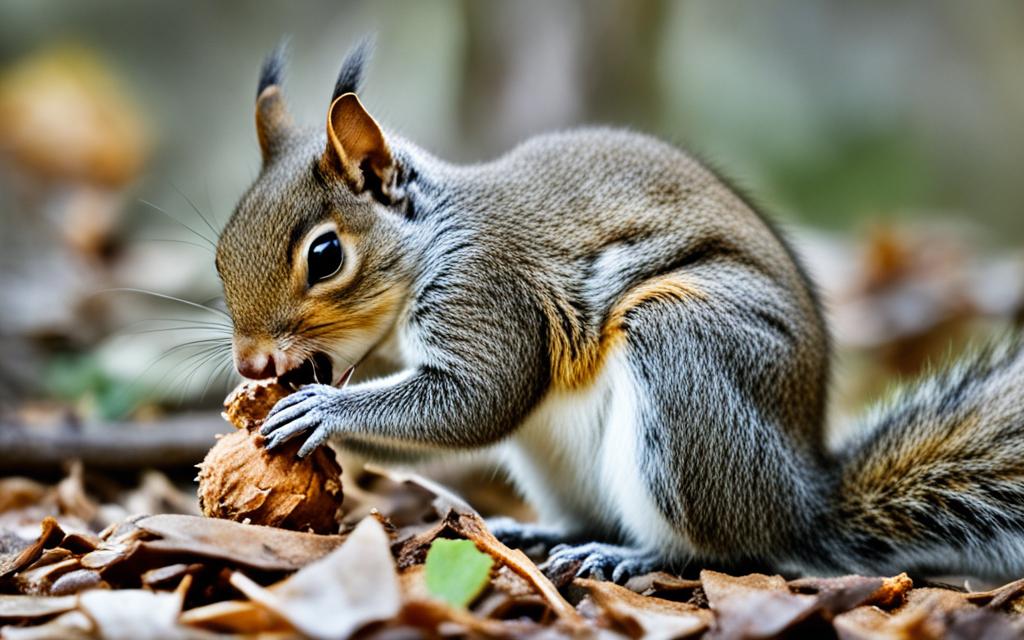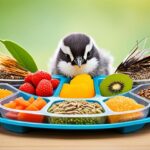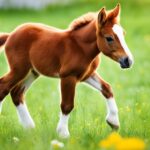In this article, we will provide essential feeding tips for baby squirrels (Eat). Whether you are caring for orphaned squirrels or simply want to ensure proper nutrition for young squirrels in your area, understanding what they eat is crucial.
Feeding baby squirrels requires a good understanding of their diet and nutritional needs. Providing them with the right food options will contribute to their overall health and development. Let’s explore the different aspects of a baby squirrel’s diet and how to care for these adorable creatures.
Key Takeaways:
- Baby squirrels primarily rely on their mother’s milk for the first few months of their lives.
- When caring for orphaned squirrels, it is necessary to provide them with a milk replacement formula specifically designed for their nutritional needs.
- As baby squirrels become more independent, they start to incorporate solid foods into their diet.
- Nuts, seeds, fruits, vegetables, and protein sources are all important components of a baby squirrel’s diet.
- Proper hydration, supplementation, and a feeding schedule are essential for the health and well-being of baby squirrels.
The Natural Diet of Baby Squirrels
When it comes to the diet of baby squirrels, their journey begins with their mother’s milk. For the first few months of their lives, they rely solely on their mother’s milk for nutrition and hydration. This rich milk provides them with the essential nutrients they need to grow and develop.
As baby squirrels grow, they start to explore the world around them, including the various foods available in their environment. This is an important phase in their development, as it helps them adapt to a wider range of foods and prepares them for a more independent life.
Exploring a Variety of Foods
As their natural curiosity drives them, baby squirrels begin to sample different foods they come across, such as nuts, seeds, fruits, and even some types of vegetation. This exploration helps them develop their tastes and preferences and ensures they have a diverse diet.
“The natural diet of baby squirrels involves a mixture of milk, nuts, seeds, fruits, and small amounts of vegetation, which they continue to consume as they grow.”
By understanding their natural diet, you can provide suitable options when caring for baby squirrels. It’s essential to mimic their natural feeding patterns as closely as possible to ensure their nutritional needs are met.
| Food Group | Examples |
|---|---|
| Nuts & Seeds | Acorns, walnuts, hazelnuts, sunflower seeds |
| Fruits | Apples, berries, pears |
| Vegetation | Leaves, buds, shoots |
| Milk | From mother’s milk or a suitable milk replacement formula |
It’s important to note that baby squirrels still require their mother’s milk or a suitable milk replacement formula even as they transition to solid foods. Milk continues to provide them with essential nutrients and promotes healthy growth.
As we delve deeper into this article, we will explore the different aspects of feeding baby squirrels, including milk replacements for orphaned squirrels and the introduction of solid foods. Let’s make sure these little creatures have everything they need to thrive!
Milk Replacements for Orphaned Squirrels
When caring for orphaned squirrels, it is crucial to provide them with a suitable milk replacement formula to meet their nutritional needs. As the primary source of nourishment for these young squirrels, the milk replacement formula should closely resemble their mother’s milk, providing essential nutrients for their growth and development.
Fortunately, there are various options available in the market that cater specifically to the dietary requirements of orphaned squirrels. These formulas are specially formulated to provide the right balance of proteins, fats, and carbohydrates, mimicking the composition of natural squirrel milk.
Administering the milk replacement formula correctly is important to ensure the squirrel’s health and growth. It’s essential to follow the instructions provided by the manufacturer regarding the amount of formula to be given and the frequency of feedings. Additionally, using a specialized feeding syringe or bottle with a small nipple designed for small mammals can help facilitate the feeding process.
Recommended milk replacement formulas for orphaned squirrels:
| Brand | Description | Link |
|---|---|---|
| Mazuri | A complete milk replacer for squirrels that supports growth and development. | Mazuri Squirrel Milk Replacer |
| Esbilac | A highly digestible formula suitable for orphaned squirrels and other small mammals. | Esbilac Squirrel Formula |
| Fox Valley | A nutritionally balanced formula with added probiotics to support healthy digestion. | Fox Valley Squirrel Formula |
It’s crucial to monitor the squirrels’ weight and overall health regularly while feeding them the milk replacement formula. Seek advice from a wildlife expert or veterinarian if you notice any signs of poor appetite, diarrhea, or other health concerns.
Feeding Tips for Orphaned Squirrels:
- Feed the milk replacement formula at room temperature to ensure the squirrel’s comfort.
- Handle the orphaned squirrels gently and ensure they are in a secure and relaxed position during feeding.
- Feed them in small amounts, gradually increasing the volume as they grow and develop.
- Keep the feeding utensils clean and sanitized to prevent the risk of infections.
- Offer the formula according to a regular schedule to establish a routine for the squirrels.
Remember, providing proper nutrition is essential for the welfare of orphaned squirrels. Adequate milk replacement and appropriate feeding practices contribute to their healthy growth, preparing them for eventual independence in the wild.
Introducing Eat Solid Foods to Baby Squirrels
As baby squirrels grow and develop, they naturally transition from relying solely on their mother’s milk to incorporating solid foods into their diet. Introducing solid foods at the right time is crucial for their nutritional needs and fostering their independence. It’s important to provide safe and nutritious options that will support their growth and overall health.
The appropriate time to introduce solid foods eat to baby squirrels is when they are around 6 to 7 weeks old. At this stage, their teeth begin to emerge, and they show an interest in exploring their surroundings. It’s a clear indication that they are ready to start experimenting with solid food.
When selecting solid foods to eat for baby squirrels, opt for natural and unprocessed options. Soft, easy-to-chew foods are ideal for their delicate teeth and developing digestive systems.
Here are some safe and nutritious solid foods that you can introduce to baby squirrels:
- Baby cereal: Mix a small amount of baby cereal with formula or water to create a mushy consistency that is easy for them to consume.
- Soft fruits: Mash ripe fruits such as bananas or avocados into a paste-like texture. These fruits are gentle on their digestive system and provide essential nutrients.
- Steamed vegetables: Steam vegetables like carrots or peas until they are soft and easily mashed. This allows baby squirrels to consume the nutrients without struggling with the texture.
- Soft nuts: Crush small pieces of soft nuts, such as cashews or pecans, for the baby squirrels to enjoy. Nuts are an important part of their diet in later stages.
Remember to introduce one new food at a time to ensure that baby squirrels can tolerate and digest it properly. Observe their reaction to each new food and make adjustments as needed. This process allows you to identify any potential allergies or digestive issues early on.
Giving baby squirrels the opportunity to explore and enjoy solid foods is an exciting milestone in their development. It equips them with the necessary skills to find their own food as they grow older. However, it’s important to continue providing milk or a milk replacement formula as a significant part of their diet, as they still require the essential nutrients and hydration it provides.
Nuts and Seeds: A Staple in a Squirrel’s Diet
Nuts and seeds are an essential component of a baby squirrel’s diet. These nutritious foods provide them with the energy and nutrients they need to grow and develop. Here are some specific types of nuts and seeds that are suitable for feeding baby squirrels:
- Walnuts
- Almonds
- Hazelnuts
- Pecans
- Sunflower seeds
- Pumpkin seeds
When offering nuts to baby squirrels, it’s important to ensure they are raw and unsalted. Avoid providing roasted or salted nuts, as these may contain harmful additives. Additionally, remove any shells or husks from the nuts and seeds to prevent choking hazards.
Preparing nuts and seeds for baby squirrels:
- Crush the nuts and seeds into small pieces or grind them to create a fine powder.
- Mix the crushed nuts or powder with other foods, such as fruits or vegetables.
- Ensure the consistency is appropriate for the baby squirrel’s age and chewing abilities.
The Importance of Portion Sizes
It’s crucial to feed baby squirrels appropriate portion sizes of nuts and seeds to maintain a balanced diet and prevent overeating. Providing the right amount ensures they receive necessary nutrients without causing any digestive issues or weight problems.
Here are some general guidelines for portion sizes:
| Age | Nut/Seed Portion Size |
|---|---|
| 0-4 weeks | A small pinch |
| 4-8 weeks | 1-2 crushed nuts/seeds |
| 8-12 weeks | 2-4 crushed nuts/seeds |
Remember, these are just guidelines, and individual baby squirrels may have different needs. It’s always best to consult with a wildlife expert or veterinarian for specific advice on feeding baby squirrels.
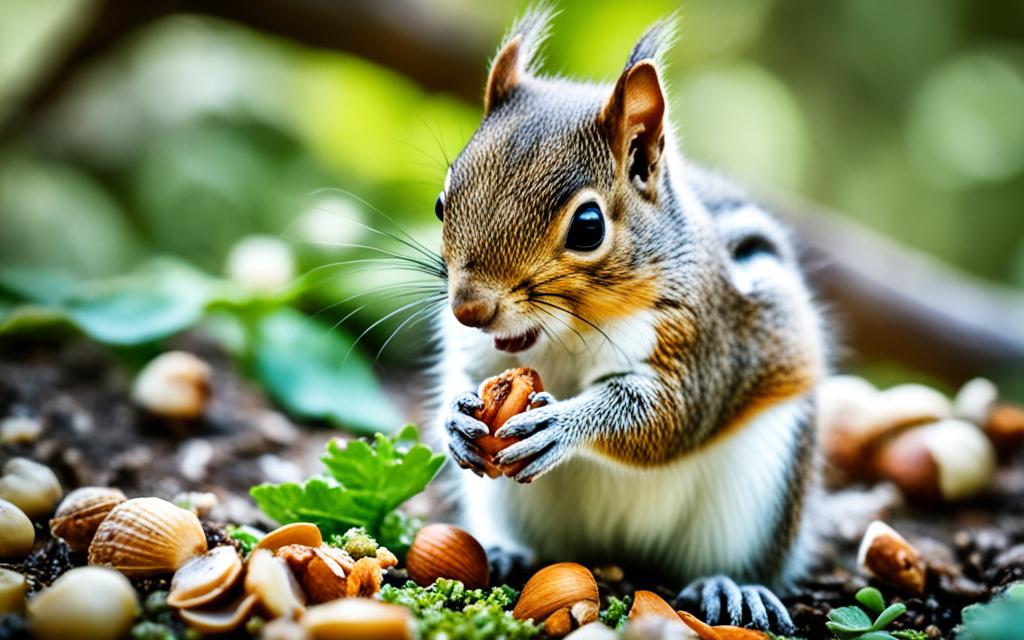
Fruits and Vegetables for Baby Squirrels
Adding fruits and vegetables to a baby squirrel’s diet is essential for providing them with the necessary vitamins and minerals. These natural foods contribute to their overall health and promote proper growth and development. Here are some of the best fruits and vegetables that you can include in a baby squirrel’s diet:
| Fruits | Vegetables |
|---|---|
|
|
|
|
|
|
To safely prepare fruits and vegetables for baby squirrels:
- Thoroughly wash all produce to remove any pesticides or dirt.
- Cut fruits and vegetables into small, manageable pieces that the baby squirrels can easily eat.
- Offer a variety of fruits and vegetables to ensure a well-rounded diet.
- Introduce new foods gradually and monitor the squirrel’s response for any signs of allergies or digestive issues.
The recommended daily amounts of fruits and vegetables for baby squirrels depend on their age and size. Consult with a wildlife expert or veterinarian for specific guidelines tailored to the needs of the baby squirrels you are caring for.
Incorporating fruits and vegetables into the diet of baby squirrels is essential for their overall well-being. These vibrant and nutritious foods provide vital vitamins and minerals that support their growth and health. Remember to introduce new foods gradually and consult with experts to ensure the best diet for these tiny creatures.
Protein Sources for Baby Squirrels
Protein is essential for the growth and development of baby squirrels. Incorporating a variety of protein sources into their diet ensures they receive the necessary nutrients for healthy development. Here are some protein-rich foods that can be beneficial for baby squirrels:
- Insects: Baby squirrels naturally consume insects as they explore their surroundings. Mealworms and crickets are excellent sources of protein and can be offered to baby squirrels. These can be sourced from pet stores or bait shops.
- Eggs: Hard-boiled eggs provide a good source of protein for baby squirrels. Mash the egg into small, manageable pieces and offer it as a part of their diet.
- Lean Meats: Small portions of lean meats, such as cooked chicken or turkey, can be included in a baby squirrel’s diet. Remove any skin, bones, or seasoning before serving.
It is important to note that protein sources should be introduced gradually and in appropriate quantities. Providing a balanced diet that includes both protein and other essential nutrients is key to the overall health and well-being of baby squirrels.
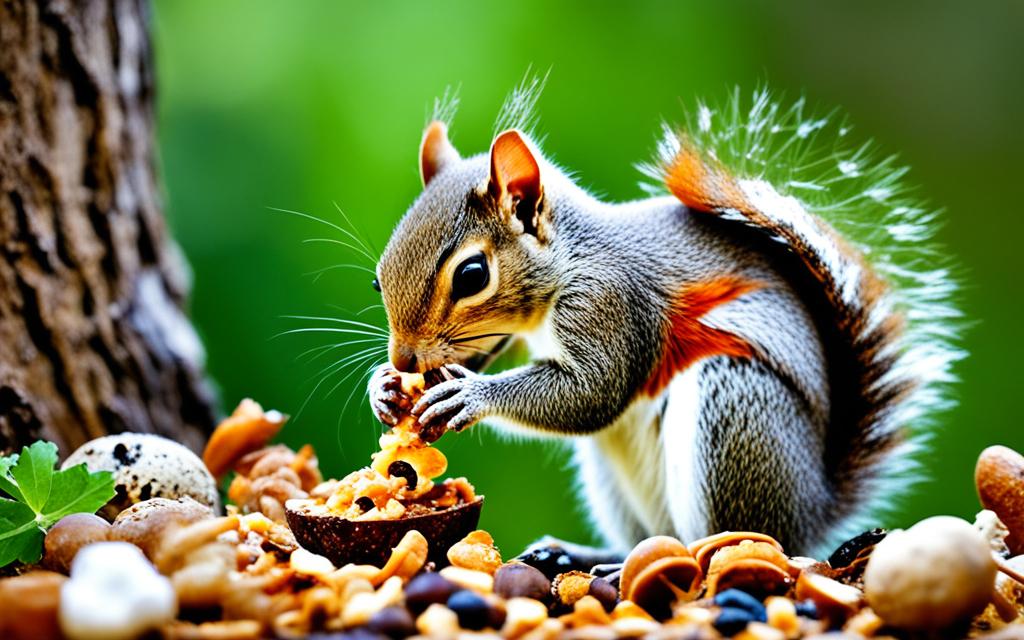
Water and Hydration for Baby Squirrels
Proper hydration is crucial for the overall health and well-being of baby squirrels. Just like humans, these little creatures rely on water to maintain their bodily functions and avoid dehydration. In this section, we will discuss the importance of providing access to clean water and offer tips on monitoring their water intake.
Why is Water Important for Baby Squirrels?
Water plays a vital role in the digestion, metabolism, and overall functioning of a baby squirrel’s body. It helps regulate body temperature, aids in the transportation of nutrients, and ensures proper hydration of their organs and tissues. Without adequate water intake, baby squirrels can quickly become dehydrated, leading to serious health issues.
Providing Access to Clean Water
When caring for baby squirrels, it is essential to provide them with a constant supply of clean, fresh water. Place a shallow dish or water bottle in their enclosure, making sure it is easily accessible for the little ones. Ensure that the water source is cleaned and replenished regularly to prevent bacterial growth and contamination.
Tip: Avoid using deep dishes that may pose a drowning risk to the baby squirrels.
Monitoring Water Intake
Monitoring the water intake of baby squirrels is crucial to prevent both dehydration and overhydration. Baby squirrels should have regular access to water, but it’s important not to force them to drink excessive amounts. Observe their behavior and check the water source regularly to ensure they are adequately hydrated.
Tip: If you notice a significant decrease in the baby squirrel’s water intake or signs of dehydration (such as lethargy, dry mouth, sunken eyes), it’s crucial to consult with a wildlife expert or veterinarian immediately.
Supplementing with Vitamins and Minerals
Sometimes, baby squirrels may require additional supplementation to meet their nutritional needs. While a balanced diet of milk replacements, nuts, seeds, fruits, vegetables, and protein sources is essential, vitamins and minerals play a crucial role in supporting their growth and development.
The Importance of Vitamins
Vitamins are essential micronutrients that help regulate various bodily functions, enhance immune system functioning, and support overall health. Baby squirrels can benefit from certain vitamins, including:
- Vitamin A: Supports vision and healthy cellular function
- Vitamin D: Promotes bone development and calcium absorption
- Vitamin E: Acts as an antioxidant and supports cellular health
- Vitamin B: Assists in energy metabolism and nerve function
These vitamins can be obtained through their natural diet, but supplementation may be necessary in certain cases where deficiencies are suspected or to ensure optimal nutrition.
The Role of Minerals
Minerals are essential for various physiological processes, including proper skeletal formation, nerve function, and fluid balance. Some essential minerals for baby squirrels include:
- Calcium: Promotes bone and teeth development
- Phosphorus: Required for energy metabolism and skeletal health
- Iron: Essential for oxygen transport and red blood cell formation
- Zinc: Supports immune system function and wound healing
Just like vitamins, minerals can be obtained through a well-balanced diet, but supplementation may be necessary in specific situations or if a deficiency is suspected.
Choosing the Right Supplements
When considering vitamin and mineral supplements for baby squirrels, it is crucial to consult with a wildlife expert or veterinarian for appropriate guidance. They can evaluate the squirrel’s overall health and specific nutritional needs before recommending any supplements.
“Supplementation should be done under professional guidance to avoid over- or under-supplementation, which may lead to health issues. It is essential to provide the right balance of vitamins and minerals to support their overall well-being.”
Typically, supplements are available in liquid or powder form and can be mixed with the baby squirrel’s food or water. The dosage and frequency of supplementation will depend on the specific needs of the squirrel and should be discussed with the expert or veterinarian.
Administering Supplements
Supplements can be administered orally using a syringe or mixed into the baby squirrel’s food or water. It is essential to follow the instructions provided by the supplement manufacturer and the guidance of the expert or veterinarian when administering these supplements to ensure accurate dosage and proper ingestion.
Incorporating the right vitamins and minerals into a baby squirrel’s diet can help support their growth and overall health. However, it is essential to remember that supplementation should always be done under professional guidance to avoid potential health risks.
Feeding Schedule and Frequency
Establishing a proper feeding schedule and frequency is crucial when caring for baby squirrels. By following age-appropriate guidelines, you can ensure they receive adequate nutrition while mimicking their natural feeding patterns. Here are some guidelines to help you create a feeding routine:
Age-Based Feeding Schedule
It’s important to note that baby squirrels should only be fed if they are orphaned or in need of assistance. If you find a baby squirrel, try to reunite it with its mother first before intervening.
- Newborns (0-4 weeks): Baby squirrels in this age range rely solely on their mother’s milk. If you have an orphaned squirrel, consult a wildlife expert or veterinarian for guidance on feeding milk replacements.
- 4-6 weeks: During this stage, you can gradually introduce solid foods alongside milk replacements. Offer small portions of softened nuts or seeds, mashed fruits, and vegetables.
- 7-8 weeks: Baby squirrels should now be consuming a combination of milk replacements and solid foods. Increase the portion sizes and variety of foods to encourage proper growth and development.
- 8-12 weeks: By this age, baby squirrels should be transitioning to a primarily solid food diet. Offer a balanced mix of nuts, seeds, fruits, vegetables, and protein sources.
Feeding Frequency
The frequency of feeding baby squirrels depends on their age. Here’s a general guideline:
- Newborns: Every 2-3 hours, around the clock.
- 4-6 weeks: Every 4-5 hours, reducing the night-time feedings.
- 7-8 weeks: Every 5-6 hours, with an increased focus on solid foods.
- 8-12 weeks: Every 6-8 hours, gradually reducing milk replacements as solid food consumption increases.
It’s important to monitor the baby squirrels’ weight, behavior, and overall development as you adjust the feeding schedule and quantities to ensure they are thriving. Consult with a wildlife expert or veterinarian for personalized recommendations based on the specific needs of the squirrels in your care.
Potential Hazards and Foods to Avoid
When caring for young squirrels, it is crucial to be aware of potential hazards and foods that should be avoided. While these tiny creatures may seem adaptable, certain foods can be harmful or even fatal to their health. By understanding what to steer clear of, you can ensure the well-being and safety of the baby squirrels in your care.
Foods to Avoid
While baby squirrels are explorative and curious, there are several foods that should never be included in their diet. These include:
- Chocolate: This sweet treat contains theobromine, a compound that can be toxic to squirrels and other animals.
- Caffeine: Similar to chocolate, caffeine should be strictly avoided as it can adversely affect the heart rate and nervous system.
- Processed Foods: Foods that are high in salt, sugar, and artificial additives can be detrimental to a squirrel’s health and lead to nutritional imbalances.
- Fruits with Pits: Fruits like cherries, peaches, and plums should have their pits removed before offering them to baby squirrels as the pits can pose a choking hazard.
- Avocado: While healthy for humans, avocados contain a toxin called persin that can be dangerous to squirrels.
- Moldy or Spoiled Foods: Consuming moldy or spoiled food can lead to digestive issues and even poisoning in baby squirrels.
Potential Hazards
In addition to specific foods, there are other potential hazards to be aware of when caring for young squirrels:
- Pesticides and Chemicals: Avoid exposing baby squirrels to pesticides and chemical-based products as they can be highly toxic to their delicate systems.
- Open Flames and Hot Objects: Keep young squirrels away from open flames, hot surfaces, and objects that can cause burns or injuries.
- Sharp Objects: Baby squirrels are curious and may encounter sharp objects like needles, pins, or broken glass. Ensure the environment is free from such hazards.
- Predators and Dangerous Animals: Protect baby squirrels from potential predators and dangerous animals, securing their living space to prevent access from larger animals.
If you suspect that a baby squirrel has ingested harmful food or been exposed to a hazard, it is essential to seek immediate veterinary assistance. Prompt action can be life-saving for these tiny creatures.
Remember, prevention is key when it comes to caring for young squirrels. By avoiding hazardous foods and ensuring a safe environment, you can provide them with the best chance of healthy growth and development.
Conclusion
In conclusion, providing the right nutrition is essential for the proper growth and well-being of baby squirrels. By understanding their natural diet and offering a balanced variety of foods, you can ensure that these tiny creatures thrive.
When caring for baby squirrels, it is important to include milk replacements that meet their nutritional needs. Additionally, nuts, seeds, fruits, vegetables, and protein sources should be incorporated into their diet to provide essential vitamins, minerals, and proteins.
Hydration is key, so make sure to monitor their water intake and provide clean water for them. It’s also important to consult with a wildlife expert or veterinarian for specific guidelines and advice on the care of baby squirrels.
With the right diet and care, you can play a crucial role in helping baby squirrels grow into healthy adults. So, embrace this rewarding experience and give these adorable creatures the best start in life!
FAQ
What do baby squirrels eat?
Baby squirrels primarily rely on their mother’s milk for the first few months of their lives. As they grow, they start to explore a wider variety of foods in their surroundings.
What is the natural diet of baby squirrels?
The natural diet of baby squirrels includes their mother’s milk, nuts, seeds, fruits, vegetables, and small insects.
What milk replacements can I give to orphaned squirrels?
Orphaned squirrels can be given specially formulated milk replacement formulas designed for their nutritional needs. An example is Esbilac, a popular brand used for caring for orphaned squirrels.
When should I introduce solid foods to baby squirrels?
Solid foods can be introduced to baby squirrels once they are around 6-7 weeks old and showing interest in exploring their surroundings. It is important to start with soft and easily chewable foods.
What types of nuts and seeds are suitable for baby squirrels?
Baby squirrels can eat a variety of nuts and seeds, such as almonds, walnuts, pecans, and sunflower seeds. These should be crushed or finely chopped to make it easier for them to consume.
What fruits and vegetables can I give to baby squirrels?
Baby squirrels can be given small pieces of fruits like apples, pears, and berries, as well as vegetables like leafy greens, carrots, and squash. These should be finely chopped or grated to make them manageable for the squirrels to eat.
What are some protein sources for baby squirrels?
Baby squirrels can be offered small portions of lean meats, cooked eggs, and insects like mealworms or crickets as sources of protein. These should be provided in moderation and properly prepared.
How can I ensure proper hydration for baby squirrels?
Baby squirrels should have access to clean and fresh water at all times. You can provide them with a shallow dish of water or use a small water bottle designed for small animals.
Should I supplement baby squirrels with vitamins and minerals?
In some cases, supplementation with vitamins and minerals may be necessary. Consult with a wildlife expert or veterinarian for specific recommendations on the appropriate supplements and administration methods.
What should be the feeding schedule and frequency for baby squirrels?
The feeding schedule and frequency for baby squirrels vary depending on their age. As a general guideline, they should be fed every 3-4 hours during their first few weeks, gradually reducing the frequency as they get older.
Are there any potential hazards or foods to avoid when feeding baby squirrels?
Yes, some foods can be harmful or toxic to baby squirrels. Examples include chocolate, caffeine, salty foods, and anything containing artificial sweeteners. It is best to avoid feeding them human food and consult experts for a comprehensive list of hazardous foods.

